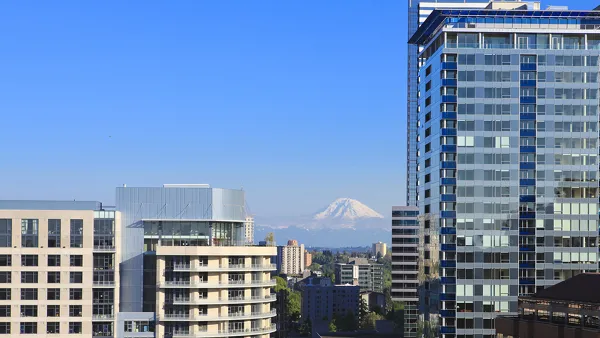The National Institute for Transportation and Communities released a new study this week called "Lessons from the Green Lanes: Evaluating Protected Bike Lanes in the U.S."
According to the study's abstract, "few U.S. cities have direct experiences with [protected bike lanes'] design and operations, in part because of the limited design guidance provided in the past," but preliminary research suggests that protected bike lanes can increase the number of bikers. "This research evaluates protected bike lanes in five distinct contexts varying in population, driving and cycling rates and cultures, and weather: Austin, Texas; Chicago, Illinois; Portland, Oregon; San Francisco, California; and, Washington, District of Columbia."
Michael Andersen provides analysis of the study on the People for Bikes website, noting specifically (with a lot of helpful detail) three things protected bike lanes don't do, namely:
- They can't rapidly boost citywide bike ridership without a network.
- They can't always separate bikes and cars completely.
- They can't be created without at least a little opposition.
The study was led by Christopher Monsere and a team of researchers from Portland State University.
FULL STORY: Lessons from the Green Lanes: Evaluating Protected Bike Lanes in the U.S.

Analysis: Cybertruck Fatality Rate Far Exceeds That of Ford Pinto
The Tesla Cybertruck was recalled seven times last year.

National Parks Layoffs Will Cause Communities to Lose Billions
Thousands of essential park workers were laid off this week, just before the busy spring break season.

Retro-silient?: America’s First “Eco-burb,” The Woodlands Turns 50
A master-planned community north of Houston offers lessons on green infrastructure and resilient design, but falls short of its founder’s lofty affordability and walkability goals.

Test News Post 1
This is a summary

Analysis: Cybertruck Fatality Rate Far Exceeds That of Ford Pinto
The Tesla Cybertruck was recalled seven times last year.

Test News Headline 46
Test for the image on the front page.
Urban Design for Planners 1: Software Tools
This six-course series explores essential urban design concepts using open source software and equips planners with the tools they need to participate fully in the urban design process.
Planning for Universal Design
Learn the tools for implementing Universal Design in planning regulations.
EMC Planning Group, Inc.
Planetizen
Planetizen
Mpact (formerly Rail~Volution)
Great Falls Development Authority, Inc.
HUDs Office of Policy Development and Research
NYU Wagner Graduate School of Public Service



























